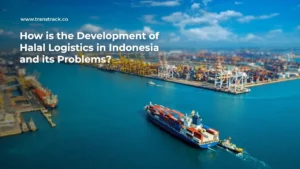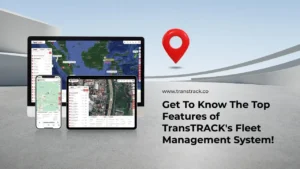Causes, Reasons, Tips, and How to Calculate Demurrage
Posted on September 5, 2023 by Nur Wachda Mihmidati

Demurrage refers to fees or fines charged to parties who use or rent vessels, containers or other storage facilities for exceeding the time limit specified for such use. This term is commonly used in the shipping and logistics industry.
In general, these fines aim to encourage efficiency and timeliness in the logistics process, prevent accumulation of goods or containers at ports, and provide incentives for the parties involved to maintain a predetermined schedule and usage time. Check out the explanation in the following TransTRACK article!
Reason for demurrage fee
Demurrage fees are charged for several main reasons:
Operational Efficiency
These fines are designed to drive efficiency in the supply chain. If ships or containers remain in ports or storage locations for too long, this can cause buildup and disrupt the efficient flow of goods. By imposing a demurrage fee, the parties involved are more likely to avoid unnecessary delays.
Asset Availability
In the shipping and logistics industry, vessels, containers and storage facilities are valuable assets. When these assets are caught in a delay, they cannot be used for shipping or other storage, thereby reducing the availability of the assets for others who need them. These penalty fees help compensate asset owners for potential lost earnings due to delays.
Schedule Maintenance
The demurrage fee also aims to encourage all parties involved in the delivery or storage process to adhere to a predetermined schedule. Delays in removing or returning goods can disrupt a larger operational schedule, such as subsequent deliveries or use of assets in other projects.
Compensation for Losses
In some cases, delays can result in financial losses for other parties in the supply chain. For example, if the goods arrive late and cause the consignee to lose business opportunities or have to pay additional fees, a demurrage fee can serve as a form of compensation for the loss.
Encouraging Inventory Management
Demurrage costs also encourage parties who own goods or containers to manage their inventory properly. By avoiding unnecessary delays, they can optimize the use of assets and avoid additional costs.
It is important to note that the reasons for demurrage charges may vary depending on the particular industry and situation. Demurrage fees are not just about imposing fines, they are also part of efforts to maintain smooth logistical processes and efficient operations.
Causes of demurrage
Demurrage occurs when there is a delay in the process of sending or using a vessel, container or storage facility beyond a predetermined time limit. Some common causes of demurrage include:
Delays in Loading or Unloading
One of the main causes of demurrage in the shipping industry is delays in loading or unloading goods at ports. If the goods are not immediately loaded from the ship or are not immediately removed from the ship upon arrival at the port of destination, the ship will be stuck in port longer than planned, resulting in demurrage costs.
Administrative Constraints
Sometimes, administrative hurdles such as complicated paperwork, pending permits or customs issues can cause delays in the loading or unloading process. This could result in the ship being stuck in port longer than planned.
Equipment Availability Issues
If there are not enough containers or transport equipment available at the port, the process of loading or unloading goods can be hampered. This can result in delays and demurrage fees.
Weather Disturbances or Natural Conditions
Disruption of bad weather, high waves, or other natural conditions can disrupt the process of loading or unloading at the port. Ships may have to wait for weather conditions to improve before they can resume operations, which can result in demurrage charges.
Operational Disruption
Operational disruptions at the port, such as equipment breakdowns, strikes, or other technical problems, can result in delays in the loading or unloading process. This can affect ship schedules and result in demurrage fees.
Schedule Mismatch
If delivery schedules are not well coordinated between various parties in the supply chain, for example between senders, receivers and ship operators, time discrepancies may occur which cause ships to have to wait longer than expected.
Land Transportation Problems
Delays in ground transportation to pick up or deliver containers to or from ports can also be a cause of demurrage. If the container does not arrive or is not collected on time, the vessel or storage facility may have to wait longer.
Piling up at the Harbor
If there is a buildup of goods or containers at the port, the ship may have to wait its turn for loading or unloading. This could be due to high volumes of goods or operational problems at the port.
All of the factors above can cause delays in the logistics and operational processes, which in turn result in demurrage costs that must be borne by the parties involved.
[display-post-read-also]
How to calculate demurrage fees
The demurrage fee is calculated based on the contract agreement between the parties involved in the delivery or storage of goods, as well as the rules that apply in the industry. Calculation methods may vary depending on the type of asset (such as a ship or container) and the terms of the contract. The following are general steps that can be followed to calculate the demurrage fee:
Identify Deadline
First of all, you need to identify the time limit that has been set in the contract for the use of the asset. For example, if you charter a boat, the contract might specify how long the ship can be in port before a demurrage fee is charged.
Calculate Delay Time
Determine how long the asset is actually overdue. This involves calculating how long the asset has been used past the allotted time limit.
Get to know Demurrage Rates
The contract or agreement will usually include the applicable demurrage rate. This rate can be in the form of a daily fee or an hourly fee depending on the industry and type of asset.
Cost Calculation
Calculate the demurrage fee by multiplying the demurrage rate by the amount of delay time calculated in the second step. For example, if the demurrage rate is $100 per hour and your ship is late for 10 hours, the demurrage fee will be $100 x 10 hours = $1000.
Check Special Terms
Some contracts may have special provisions, such as a maximum demurrage fee limit or more complex calculations based on certain types of goods or conditions. Make sure to check the contract carefully to understand all these details.
Adjust to External Factors
In some cases, external factors such as weather changes or unforeseen natural circumstances may affect the calculation of the demurrage fee. Contracts or industry rules may have provisions to address these types of situations.
Professional Consultation
If you are unsure about how to calculate the demurrage fee or if there is any ambiguity in the contract, it is advisable to consult an expert or legal professional with experience in the shipping and logistics industry.
Remember that demurrage costs are a consequence of delays which may be avoided by managing logistics and operational processes properly. Therefore, it is important to always try to adhere to a set schedule to avoid unnecessary demurrage fees.
Tips to avoid demurrage
Here are some great tips for avoiding demurrage costs in logistics operations. Here is a further explanation of each tip:
Use the Truck Appointment System (TAS) Application
Truck Appointment System applications such as TransTRACK are digital solutions that help schedule the arrival of trucks or other vehicles to ports or logistics facilities. The advantages of using TAS TransTRACK and similar applications are:
Coordinated Schedule
Enables parties involved to better plan the arrival time of vehicles to the logistics facility, reducing the possibility of congestion and delays.
Real-time Monitoring
Real-time monitoring of vehicles allows ports or logistics facilities to match loading and unloading activities to the time of arrival of vehicles.
Load Priority
Helps allocate loading or unloading time according to a pre-planned schedule, avoiding unnecessary delays.
Improve Management
Team Coordination
Make sure all related teams, including the logistics team, senders and recipients, work in a coordinated manner and understand the schedule that has been set.
Activity Monitoring
Actively monitor loading, shipping and unloading activities. If there are signs of a delay, identify the cause immediately and take steps to address it.
Contract Repair
Schedule Terms
Make sure the contract has clear provisions regarding the time limit for using the asset and demurrage fees if the time limit is exceeded.
Exceptions and Special Circumstances
Consider including exclusionary conditions or how to handle special circumstances that may cause delays.
Improve SOP (Standard Operating Procedures)
Efficient Loading and Unloading
Improve SOP for loading and unloading goods to be more efficient and organized.
Vehicle Maintenance
Improve SOPs related to vehicle maintenance so that trucks or other vehicles are always ready for use and do not experience unexpected technical problems.
By following these steps, you can help reduce the risk of incurring demurrage costs in your logistics operations. Use of technology, effective management, contract improvement and sound SOPs all contribute to ensuring that goods arrive and are released from logistics facilities smoothly and on time.
By adopting TransTRACK’s Truck Appointment System (TAS), you can not only avoid costly demurrage fees, but also improve the overall efficiency of your logistics operations. There’s no reason to face uncoordinated schedule constraints and annoying delays. With TransTRACK, you can manage schedules precisely, monitor vehicle movements in real-time, and optimize your logistics processes for greater success.
Increase the efficiency of your logistics operations with TransTRACK today. Visit our site for more information and start optimizing your business without unnecessary demurrage fees.
Recent Post
Topic :
 Bahasa Indonesia
Bahasa Indonesia









